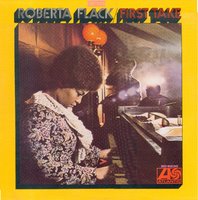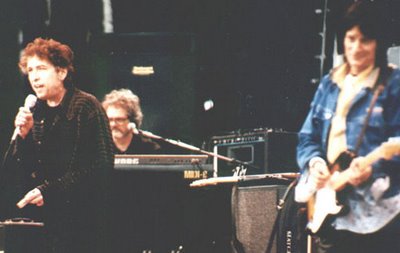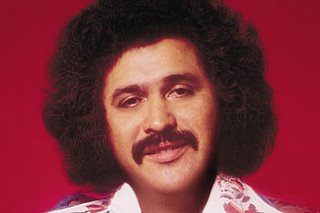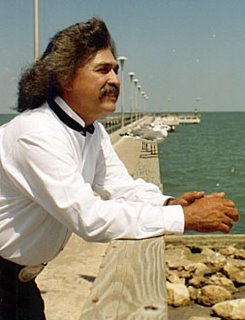
With the success of
Brokeback Mountain last year, a lot was made of the gay cowboy. It didn’t take much reflection to reveal that Western films – filled as they were with chaps-wearing, gun-toting and leather-obsessed cow rustlers and horse wranglers – were, in fact, gay all along, as many have noted. But then again, the case could be made that just about every movie genre has its homoerotic elements. Ever seen
Smoky and the Bandit?
But what about the gay country singer? There are fewer paradigms there. For the ladies, Patsy Cline was embraced as a sort of lesbian icon; Loretta Lynne had her candid feminism of the people ("Rated X" and "The Pill"); and then there’s Dolly Parton ... shhh, don't tell anybody. For the dudes, that leaves Randy Travis, who, it turns out, was from Marshville, NC, not far from where I sort of grew up. Rumor always had it that Travis, who, like Parton, married his manager who happens to be quite a bit older than him, was gay. I suspect that Nashville is sort of like Hollywood in the 50s (and today) in that there are probably loads of stars that everyone knows are gay, but who still have to maintain their hetero image in order to keep their fans. You have to really see the cover of the record No Holding Back (I still can't seem to post images), from which comes the great, sappy song "He Walked on Water." There's a lot of gay semiotics at work. The muscle-T, the jeans, the stance, the general equestrian scenario. I remember raising my opinion of Robert Christgau when I read a short piece in which he praised "He Walked on Water." This song is basically about a kid who idealized his old toothless great-grandfather. Aside from the lines of the opening verse: "He wore starched white shirts, buttoned at the neck/And he's sit in the shade and watch the chickens peck/His teeth were gone, but what the heck/" there are some other choice ones (Travis didn't write it, BTW), like "He could handle a rope and he was good with a gun/And my mama's daddy was his oldest son." Travis, whose voice can dip and puff and get all bowels-of-the-earth deep, is the only real heir to George Jones.
"He Walked On Water" -- Randy TravisI pretty much failed as I tried to come up with some other gay country stars. Turns out there's plenty of gay-bashing country, but that's a whole different deal. Here's one, sort of. From the still mind-blowing Song-Poem Anthology that came out in 2003, this is "I Lost My Girl to an Argentinian Cowboy" -- just savor the lyrics on this one.
"I Lost My Girl to an Argentinian Cowboy" - Artist unknownFinally, here's two from old Hag. Merle Haggard makes a condescending little chuckle when he talks about the "two kinds of fairies" in "My Own Kind of Hat." He has perplexing distinct emphatic taxonomies. It's sort of a question for Magritte or Sartre or someone, but what does it mean to wear your own kind of hat?
And I know this is a stretch, but I thought I could yoke "Rainbow Stew" to this theme. You know, rainbows. This is Merle at his obnoxious best -- a complete curmudgeon, railing against idealistic environmentalists, yet somehow revealing the idiocy of a do-nothing attitude. An added bonus: fake live crowd sounds and an E Street Band-style sax solo. Free bubble up.
"My Own Kind of Hat" -- Merle Haggard"Rainbow Stew" -- Merle Haggard"Here's a quarter, call someone who cares": a tangential ruminationFor me, the song "He Walked On Water" will always evoke the summer of 1990. There's a "game" you'd sometimes see at truck stops and arcades, at least down south you would, it consists of two tiers that are basically covered in quarters. One of the shelves slowly pushes in a few inches at regular intervals, compressing and reconfiguring the quarters on the bottom tier, nudging them toward an overhang that will dump whatever quarters fall off into a basin that the player can retrieve. A well-placed quarter, dropped carefully into the gap created by the moving shelf can, when the shelf comes back to push it toward the ledge, cause a few dollars worth of coins to drop off into the bin. It always looks like 10 or 12 quarters are dangling, ready to drop, and that's how you get roped in. This was a summer during which I worked at the lesbian cafe/bookstore and basically survived by eating my meals of cheese melted bagels and tempeh and avocado sandwiches during my shifts, or else making big pots of lentils with our housemates. There were some dumpster-diving friends who'd sometimes drop off loads of bananas or day-old bread. Somehow, during this poverty, we got on a cheap-skate gambling kick -- we'd flip quarters, dollars, there was a famous flip for one-hundred dollars. When my friend Andy lost, he decided to pay my other friend Chris off in pennies. So Andy went to the bank and got $100 in penny rolls and we spilled them out on Chris' floor. Seemed funny at the time. Mostly just strikes me as obnoxious now. Anyway, Andy, who was an untapped songwriting/outsider art genius, was also big into the "quarter game" at the arcade. I remember that the game had the a little metal plaque that said "Redemption Game" on it, which also struck us as hilarious. After trying to figure out the key to causing a big pay-off of quarters to drop, Andy eventually settled on the superior-fire-power approach. This entailed getting $20 or so worth of quarters and then frantically trying to jam all of the quarters through the coin-sized slot during the brief time between when the moving shelves pulled back and pushed forth. You only had a few seconds. Anyway, it wasn't foolproof, but if you were lucky you might get around $30 or $35 worth of quarters to drop when you used this approach. That was a big $10 or $12 profit. But you could just as easily get only $4 back. A big loss of $16 to chumps like us. Anyway, it was at this arcade that I remember hearing, Randy Travis' "He Walked on the Water" on what you'd now call the hot new country station. I seem to remember Patty Loveless's "Timber, I'm Falling in Love" being big then too. Anyway, Andy (he was known to everyone as Anj) in his absurdist brilliance latched on to the general melody and a sort of mumbled transliteration of the lyrics. He would routinely sing his version of the chorus, taking "If the story is told, only heavn knows," and turning it into something like "If the story is told, on his briss-preyster rolls." And he could do it with the right earnest twang and dip. This really was funny. As further proof of Anj's gifts, in high school art class he spent an entire semester working on a single drawing, using a ruler and dozens of pencils sharpened to a needle point. He called the drawing "The Molecule of Insanity" -- it was like some sort of op-art outsider-art depiction of an infinitely complex crystal, with thousands of super-straight lines creating crazy convex and concave spikes, completely abandoning the rules of perspective. His art teacher wasn't sure if she should let him continue on such an obsessive project, but he stuck to it diligently and I believe he was given credit in the end. Another of Anj's homespun dadaist efforts was to paper the wall of his bedroom using the small gold foil papers that came with each box of Player's cigarettes. Anj, a big time smoker, saved hundreds and hundreds of the papers and used them to spell out a shiny "PLAYERS" on the wall above his bed.
 Probably unlike most great songwriters, Leonard Cohen’s songs often seem to lend themselves to being interpreted by others. I don’t think the same is true of Dylan or Lennon/McCartney. I’m not sure what this might mean. It’s not that Cohen’s recordings of his own tunes aren’t excellent either. I just read that Cohen was the president of the debating society when he was at McGill University. His grandfather was a Talmudic scholar. I was just looking at a Cohen songbook yesterday and there was curious ID picture of him from sort of Greek driving club. I wondered why that was, but then I just learned that he -- like the great painter Brice Marden whose retrospective just went up at MoMa and about whom there have been a bunch of articles appearing lately - owns a house on the island of Hydra. Must be a fun place to hang out.
Probably unlike most great songwriters, Leonard Cohen’s songs often seem to lend themselves to being interpreted by others. I don’t think the same is true of Dylan or Lennon/McCartney. I’m not sure what this might mean. It’s not that Cohen’s recordings of his own tunes aren’t excellent either. I just read that Cohen was the president of the debating society when he was at McGill University. His grandfather was a Talmudic scholar. I was just looking at a Cohen songbook yesterday and there was curious ID picture of him from sort of Greek driving club. I wondered why that was, but then I just learned that he -- like the great painter Brice Marden whose retrospective just went up at MoMa and about whom there have been a bunch of articles appearing lately - owns a house on the island of Hydra. Must be a fun place to hang out. But this isn’t about Leonard Cohen. Nope. It’s about Roberta Flack. I love the cover (help me Lefty) of her album First Take so much. She’s got this great floral print dress on and she’s playing the piano with a rapt concentration or else it could be a sort of spiritual focus or maybe autistic despair or maybe self-obliterating doubt. Hard to say. What drew me to this record was the fact that bassist Ron Carter, who had probably only recently stopped playing with Miles Davis at the time, plays on it. One thing I can’t quite figure out is that it lists guitarist John Pizzarelli on the credits. But the John Pizzarelli I know of, son of Bucky, was, like 9 years old at the time, though he evidently started performing out at age six. I do like the thought of a 9-year-old joining Carter and Flack, though, whatever the case may be.
But this isn’t about Leonard Cohen. Nope. It’s about Roberta Flack. I love the cover (help me Lefty) of her album First Take so much. She’s got this great floral print dress on and she’s playing the piano with a rapt concentration or else it could be a sort of spiritual focus or maybe autistic despair or maybe self-obliterating doubt. Hard to say. What drew me to this record was the fact that bassist Ron Carter, who had probably only recently stopped playing with Miles Davis at the time, plays on it. One thing I can’t quite figure out is that it lists guitarist John Pizzarelli on the credits. But the John Pizzarelli I know of, son of Bucky, was, like 9 years old at the time, though he evidently started performing out at age six. I do like the thought of a 9-year-old joining Carter and Flack, though, whatever the case may be.





